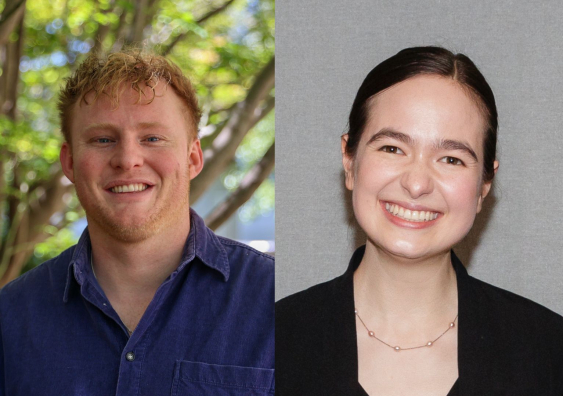Two UNSW alumni awarded prestigious scholarships to pursue post-grad study abroad
Noah Bedford and Veronica Sebesfi are among 16 Australians named as 2024 John Monash scholars.
Noah Bedford and Veronica Sebesfi are among 16 Australians named as 2024 John Monash scholars.

UNSW alumni Noah Bedford and Veronica Sebesfi will head to Harvard and Cambridge to continue their legal studies next year as John Monash Scholars.
Mr Bedford has been awarded the Bob Hawke John Monash Scholarship and will undertake a Master of Laws at Harvard University. He will focus on comparative understandings of Indigenous rights around the world, in hope of better understanding a way forward in Australia.
Ms Sebesfi has been awarded the Rio Tinto John Monash Scholarship. She plans to study a Master of Law at the University of Cambridge with a focus on intellectual property law and how the law interacts with science and technology. In the future she hopes to contribute to the development of Australian intellectual property law relating to new technologies.
Professor Andrew Lynch, Dean of the Faculty of Law & Justice, congratulated Mr Bedford and Ms Sebesfi.
“I’m so proud of Noah and Veronica, both of whom distinguished themselves as exceptional students during their time at UNSW. Noah is the UNSW Law Valedictorian for 2022 and a former Australian Indigenous Law Student of the Year, while Veronica was awarded the University Medal in Law and was UNSW Law Valedictorian for 2020,” he said.
“I wish them the very best for their future studies and careers in indigenous rights and policy law, and intellectual property, respectively, where they will undoubtedly have a meaningful impact.”
The scholarships, named in honour of General Sir John Monash, a celebrated Australian with a passion for education, leadership and service, are supported by Australian companies, governments, universities and individuals.
Mr Bedford (LLB (Hons) /Arts (Hons) ‘22) is currently adviser to Senator Patrick Dodson, Special Envoy for Reconciliation and Implementation of the Uluru Statement and Chair of the Joint Standing Committee on Aboriginal and Torres Strait Islander Affairs.
He is committed to improving the well-being and recognition of Indigenous peoples.
“There is clearly much work to be done in advancing the rights and recognition of Indigenous peoples here in Australia. This remains the unfinished business generations of leaders have sought to resolve. The referendum defeat only weeks ago means this is more pressing,” he said.
“We are home to the oldest continuing cultures on the planet, and yet we have left unaddressed the position of Aboriginal and Torres Strait Islander communities in our history. This lack of fundamental recognition is a national impasse. We must be able to find a way forward.”
Mr Bedford’s aspiration is straightforward: "to honour those who have come before us and to create a brighter future for those who are not yet here.”
Ms Sebesfi (LLB (Hons) /Bachelor of Advanced Science (Hons) ’20) has had a lifelong interest in both the sciences and the humanities. She plans to dedicate her career to the development of a system of Australian intellectual property law that understands and adapts to advances in technology.
“Australian inventions have changed, and continue to change, our community for the better. A regulatory environment underpinned by a robust system of intellectual property law provides economic rewards for creativity and invention and further incentivises innovation,” Ms Sebesfi said.
She said intellectual property law must continually adapt to be suitable for purpose as new technologies and inventions emerge.
Ms Sebesfi referred to how the Federal Court and High Court of Australia in recent years have had to grapple with questions of whether isolated nucleic acids are patentable subject matter and whether an artificial intelligence machine can be considered as an ‘inventor’ of a patent.
“I see myself making a difference in this space by being able to utilise my science background to inform my legal advocacy and my contributions to academic discussion about intellectual property law reform,” Ms Sebesfi said.